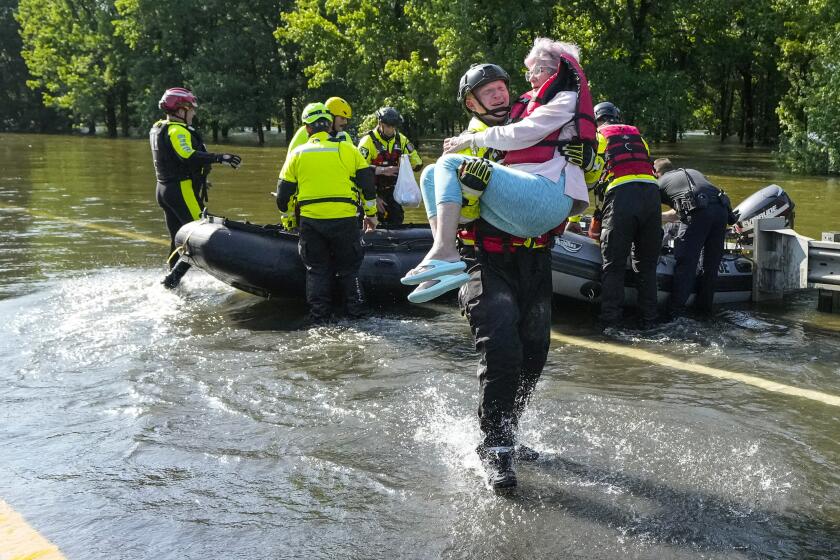Profile : Mayor Breaks Color Bar--and Settles Score in S. Africa : ‘The whites around here didn’t accept us for all those years. But now we are in the driver’s seat,’ he says.
Frank Arendse’s father toiled on a white man’s fruit farm for the best years of his life, treated as a boy by the farmer’s children and as a second-class citizen by other whites in town.
And, when the elder Arendse dropped dead, without a full-grown son to pick up his hoe, the penniless Colored family was booted off the white man’s property.
It’s taken 30 years, but Frank Arendse (ARH-end-sah) finally has won a measure of quiet revenge--and respect.
“The whites around here didn’t accept us for all those years,” Arendse said the other day. “But now we are in the driver’s seat.”
Arendse is the new mayor of Franschhoek, the first nonwhite mayor of a white town in recorded South African history--and the only nonwhite politician at any level of government with white constituents.
As a result, a good many whites here have got the disquieting feeling that one of the Cape’s notorious squalls has just pushed them over a cliff into the future. They aren’t pleased, but they’re going to have to learn to accept it.
And Arendse, now holding the tie-breaking vote between whites and mixed-race Coloreds on the town council, feels a weighty responsibility.
“My biggest concern is to see that I as a Colored do a good job,” he said, lighting a Stuyvesant cigarette, named for the revered Dutchman. “It will be bad for other towns in the country if I flop.”
Arendse’s ascension offers a rare test case in race relations that is being closely followed by an unsettled country.
The scene of that experiment is a quiet, prosperous little tourist town with one main street and a rich history. Franschhoek, which means “French corner” in Afrikaans, was named for the 17th-Century white settlers, French Huguenots, who quickly became an important component, along with Dutch and Germans, of the country’s ruling Afrikaners.
It is about an hour’s drive from Cape Town, perched on a ridge amid the mountains and fertile valleys where white capital and mostly Colored labor produce the country’s finest wines and fruit.
Like most white cities in South Africa, Franschhoek has its own township, Groendal, or Green Valley, a mile away. And whites in Franschhoek, population 1,200, are outnumbered by the 2,600 Coloreds and 900 black Africans in Groendal.
For several years now, wealthy white cities and their much poorer satellites--African, Indian and Colored townships--have been encouraged by the government to merge their local governing bodies. The idea is to use the fat tax bases in white areas, built in large part by black labor, to help upgrade neighborhoods where the workers live.
Franschhoek and Groendal began courting two years ago, their councils meeting jointly to address the region’s problems. At first, the Colored councilors just made suggestions. But the two towns were married last month, and the six Colored Groendal councilors and the six white Franschhoek councilors voted in secret ballot for a new mayor.
Two whites broke racial ranks and the vote was 8 to 4 for Frank Arendse.
“I just felt it was time to give them the mayorship,” said Arthur McWilliam Smith, the former mayor and now Arendse’s deputy mayor. Like most whites here, be they conservative or liberal, his words betray a certain historic paternalism.
“I thought it would be psychologically important for them,” said Smith, 54, who runs the South African office of an American airfreight firm. “And if it was going to be one of them, he (Frank) was the right guy.”
Catching himself, Smith added: “In fact, if it was going to be anyone, he was the right guy.”
Some whites in town have telephoned Arendse to congratulate him. But many others are not so pleased with the council’s choice for a new mayor.
“I’m against it,” said Jan Roux, 62, a white councilor and local building contractor. “It’s not about his color, but they (Coloreds) just aren’t ready for it (political leadership) yet. They are still learning.”
And he explains himself with an analogy especially appropriate in this land of fruit orchards and vineyards. “If you take a fruit before it’s ripe and you start pressing on it, it will rot in due course,” he said.
But whites here are beginning to realize that the days when whites dominated blacks, Coloreds and Indians are coming to an end.
“Everybody knows it’s the end of the road and we’re going to be a black-majority (ruled) country,” Smith explained. “But nobody expects it to happen to them.”
Frank Arendse has lived most of his life under apartheid discrimination, suffering the indignities that all nonwhites have faced at the hands of whites. But he was no enemy of the white-minority government. Far from it.
In fact, if the African National Congress had its way, Arendse would not have been the first mayor of a multiracial town. He lacks the politically correct credentials demanded of ground-breaking blacks by the ANC and other guardians of the black liberation struggle.
But, in a way, that makes him the perfect man to bridge the gap between fearful whites who embrace the old South Africa and people of all races who aspire to the new one.
Arendse was elected to his township council in 1981, when the ANC was demanding that blacks boycott township elections. Back then, ANC leaders labeled Arendse and other councilors “collaborators” with the apartheid system.
During the tumultuous anti-apartheid battles of the 1960s and 1970s, Arendse was on the state payroll as a guard at Victor Verster prison, where Nelson Mandela later spent the final years before his release.
Now, Arendse operates a discotheque, liquor store and two taverns in the Colored township. Although the mayor’s job, like that of all the councilors, is unpaid, Arendse still is the wealthiest Colored man in town.
A slender man with close-cropped black hair and a gold front tooth, Arendse has enjoyed the attention that his new position has brought Franschhoek. But he remains modest and soft-spoken, living with his wife and their three teen-age children in a large white home with green trim on the edge of the township.
Explaining why he chose to build in the township, Arendse said: “I want to be with my community, man.” And besides, he added, “Property is sky-high in the white areas.”
Arendse seems to understand the concerns of many whites here about having a Colored mayor.
“They’ve got that fear,” Arendse said. “They think, ‘Here comes a Colored or black man to rule over me.’ They think I will grab all their things for the Colored and black people. But I won’t. I represent all the people.”
Nevertheless, he hopes to quickly address the disparities between Franschhoek and its Colored township. He said his first priority will be providing housing for 250 homeless Colored and black families. Then, he said, he wants to improve the township roads, perhaps one day paving the track that leads to his house.
Arendse also hopes to end discrimination on the council payroll, proving to whites that Coloreds are equally qualified for important jobs. Of the 13 top paid officials on the council, 12 are white and only one is Colored.
“Under the old system, they always picked the whites,” he said. “Now we are looking for a new health inspector, and we’re looking for a Colored.”
Dennis van der Berg, the lone Colored official, explained: “They must just give us the opportunity. Then the world will know that Coloreds can do the job.”
Talk like that worries councilman Roux. And he contends that whites, having voted “yes” in President Frederik W. De Klerk’s referendum on apartheid in March, have only themselves to blame.
“The funniest thing is that most of the people who voted ‘yes’ are the people who are worried now,” Roux said. “They say, ‘We didn’t vote for that.’ But they did.”
Roux, whose French ancestors were among the founding fathers of Franschhoek, has decided to make the best of it.
“It’s no good running away, because then you’ve lost out altogether,” he said. “This power-sharing is going to come, anyhow.”
For Arendse, though, the stakes are high. This is a chance to repair his pride and earn the respect of all of Franschhoek’s whites, including the white farmer who evicted the Arendse family three decades ago.
That white farmer’s son is still around, and, this being a small town, Arendse sees him from time to time. The mayor said he doesn’t expect an apology after all these years, “but I think he’s sorry.”
And, Mayor Arendse added with a smile: “I’m sure he still can’t quite believe that this farm boy has grown up to become his mayor.”
Biography
Name: Frank Arendse
Title: Mayor of Franschhoek, South Africa (population 4,700).
Age: 38
Personal: Mixed-race Colored father of three teen-agers. Son of a farm worker. Former prison guard. First nonwhite mayor of a white town in South Africa. Operates a discotheque, a liquor store and two taverns.
Quote: “This (my election as mayor) is a step toward democracy. But we blacks and Coloreds don’t have full democracy yet.”
More to Read
Start your day right
Sign up for Essential California for news, features and recommendations from the L.A. Times and beyond in your inbox six days a week.
You may occasionally receive promotional content from the Los Angeles Times.







